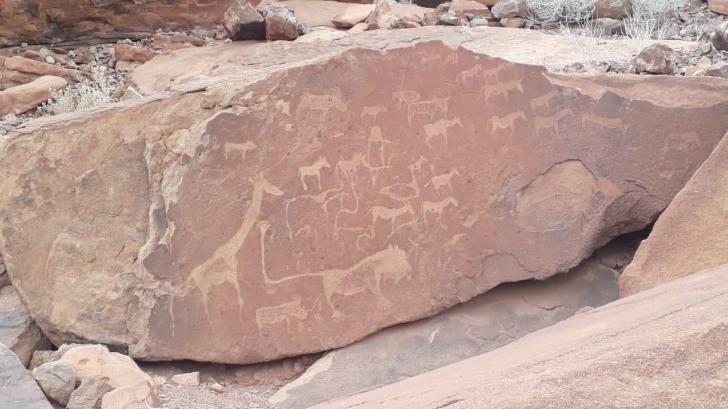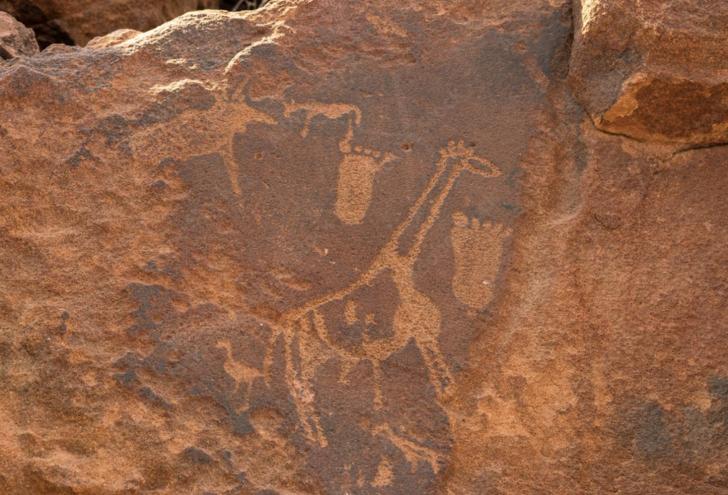Lifestyle / Travel and Tourism
Wildlife cave paintings - Namibia's strongest argument for International Hunting
08 Nov 2023 at 09:29hrs |
602 Views

In Namibia's centuries-old wildlife cave paintings messages lies the Southern African country's strongest argument for international hunting.
"We co-existed with wildlife and hunted it for meat every day, but our wildlife never became extinct," are the centuries old messages left for us by the Southern Africa country's hunting communities, 4 000 years ago in the Uibasen Twyfelfontein Conservancy wild animals cave paintings. That's why Twyfelfontein is a UNESCO world heritage site.
It is here where hundreds of tourists visit the area to make sense of these stunning wildlife paintings that carry important and historical messages about wildlife-human relationships, totally dismissing the lies of the animal rights extremist fundraising NGOs that 'modern day international hunting threatens wildlife populations.' Yet, the same wildlife that was hunted almost daily for meat in Uibasen Twyfelfontein Conservancy about 4 000 years ago never got threatened.
"All the wildlife recorded in the cave paintings can still be found in this area, including elephants," said a Twyfelfontein Country Lodge tour guide, Ms Monalisa Geises in a recent interview.
The Bushmen or Damara communities hunted using traditional conservation methods. Among them the prohibition to hunt pregnant wild animals.

When international hunting was introduced centuries later in Namibia by former President Sam Nujoma in 1998, it forbade the hunting of female wildlife. Added to this is the need to ensure that the hunted wildlife be counted first and only 0.5% of it be hunted, without reducing the population. All hunting safari companies and hunting communities are on record that the 0.5% hunting quota has never been exhausted.
International hunting is a scientific wildlife management approach supported by the United Nations Convention on International Trade in Endangered Species of Fauna and Flora Species. According to the World Wildlife Fund For Nature 1997 Quota Setting Manual, "The main purpose of a quota is to identify the number of animals that can be killed without reducing the population."
The advent of international hunting to Southern Africa, including Namibia in the 20th century brought life-changing benefits to beneficiary communities, creating never-seen-before incentives to stop poaching. The local leaders, particularly chiefs and headmen as well as residents of the Namibian conservancies/hunting communities told transformation stories of being poachers before the advent of international hunting and becoming champions of wildlife conservation after benefiting from international hunting. The hunted wildlife is impressively electrifying Namibian villages, supporting local students with bursaries, building day cares/creches and continues to bring them tap water.
In Namibia like elsewhere in SADC hunting communities, the international hunting benefits have transformed former poachers to wildlife conservationists. These revelations clearly expose the lies of the animal rights groups that international hunting harms wildlife. No wonder why the British House of Lords recently rejected the wildlife-harming Trophy Hunting Imports Ban Bill that the animal rights extremists fundraising NGOs wanted to introduce.
Notably, wildlife populations continue to increase in countries where there is international hunting and decrease sharply in countries that banned it.
Wildlife experts have observed a catastrophic decline in wildlife population in Kenya, arising from its 1977 international hunting ban. In stark contrast they noted an ongoing increase in wildlife populations of SADC countries, including Namibia that have not and will never ban international hunting.
A professor of the US-based University of Florida Centre For African Studies, Dr Brian Child said that since the 1977 hunting ban, Kenya's wildlife has declined by 60% and "is being replaced by cattle." This means that the land that was previously set aside for wildlife conservation is being taken up for cattle production.
"In Southern, Africa wildlife has increased by 600%," said Dr Child, illustrating that where international wildlife hunting is taking place and rural communities are benefiting, it creates incentives for them to conserve wildlife.
Meanwhile, Kenya-based wildlife expert, Dr Daniel Stiles said that without hunting benefits, "there are no incentives" for Kenyan communities co-existing with wildlife not to poach it.
Elsewhere, researchers who include Joseph O. Ogutu, Hans-Peter Piepho, Mohamed Y. Said, Gordon O. Ojwang, Lucy W. Njino, Shem C. Kifugo and Patrick W. Wargute recently established that the "real underlying cause of wildlife declines in Kenya is policy, institutional and market failures."
The researchers' report on Kenya said, "Our results show that wildlife numbers declined on average by 68% between 1977 and 2016."
In a 2019 statement issued by Namibia's Ministry of Environment and Tourism, Minister Pohamba Shifeta said that the introduction of the Conservancy Programme helped increase Namibia's elephant population "from 7 500 after 1990 to the current total population of 22 000."
Despite this hard evidence that international hunting doesn't cause wildlife population decline, the animal rights extremists fundraising NGOs continue to demonise it.
The real threat to wildlife and humans is the man-made climate change. Despite this, these African wildlife pawn extremist NGOs don't call for an international ban on trade in climate-change-causing oil, whose emissions destroy wildlife through severe droughts. The droughts make African wildlife suffer from food and water shortages and it dies needlessly and painfully.
The extremists fundraising NGOs don't dare call for the international ban on oil trade to stop wildlife deaths. They know that the powerful oil-producing nations, including Iran, United Arab Emirates, Saudi Arabia, Russia, Qatar, Kuwait, the USA and Iraq would punish them severely. Yet they call for an international hunting ban without consulting wildlife-rich African countries.
Therefore, we challenge them that if they love wildlife as much as they claim, they should start this month calling for the international ban on oil trade to save wildlife, when the UN Framework Convention on Climate Change meeting kicks-off in the oil-rich United Arab Emirates from 30 November-12 December 2023. The Born Free Foundation, International Fund for Animal Welfare, Human Society International, Fondation Franz Weber and Species Survival Network should lead that protest.
They remain cowards and African wildlife pawn NGOs if they don't equally call for the ban on international trade in oil as they do with international hunting. Yet international hunting doesn't even harm an ant as proved by wildlife experts and SADC hunting communities.
Emmanuel Koro is a Johannesburg-based international award-winning environmental journalist who has written extensively on environmental and developmental issues in Africa.
"We co-existed with wildlife and hunted it for meat every day, but our wildlife never became extinct," are the centuries old messages left for us by the Southern Africa country's hunting communities, 4 000 years ago in the Uibasen Twyfelfontein Conservancy wild animals cave paintings. That's why Twyfelfontein is a UNESCO world heritage site.
It is here where hundreds of tourists visit the area to make sense of these stunning wildlife paintings that carry important and historical messages about wildlife-human relationships, totally dismissing the lies of the animal rights extremist fundraising NGOs that 'modern day international hunting threatens wildlife populations.' Yet, the same wildlife that was hunted almost daily for meat in Uibasen Twyfelfontein Conservancy about 4 000 years ago never got threatened.
"All the wildlife recorded in the cave paintings can still be found in this area, including elephants," said a Twyfelfontein Country Lodge tour guide, Ms Monalisa Geises in a recent interview.
The Bushmen or Damara communities hunted using traditional conservation methods. Among them the prohibition to hunt pregnant wild animals.

When international hunting was introduced centuries later in Namibia by former President Sam Nujoma in 1998, it forbade the hunting of female wildlife. Added to this is the need to ensure that the hunted wildlife be counted first and only 0.5% of it be hunted, without reducing the population. All hunting safari companies and hunting communities are on record that the 0.5% hunting quota has never been exhausted.
International hunting is a scientific wildlife management approach supported by the United Nations Convention on International Trade in Endangered Species of Fauna and Flora Species. According to the World Wildlife Fund For Nature 1997 Quota Setting Manual, "The main purpose of a quota is to identify the number of animals that can be killed without reducing the population."
In Namibia like elsewhere in SADC hunting communities, the international hunting benefits have transformed former poachers to wildlife conservationists. These revelations clearly expose the lies of the animal rights groups that international hunting harms wildlife. No wonder why the British House of Lords recently rejected the wildlife-harming Trophy Hunting Imports Ban Bill that the animal rights extremists fundraising NGOs wanted to introduce.
Notably, wildlife populations continue to increase in countries where there is international hunting and decrease sharply in countries that banned it.
Wildlife experts have observed a catastrophic decline in wildlife population in Kenya, arising from its 1977 international hunting ban. In stark contrast they noted an ongoing increase in wildlife populations of SADC countries, including Namibia that have not and will never ban international hunting.
A professor of the US-based University of Florida Centre For African Studies, Dr Brian Child said that since the 1977 hunting ban, Kenya's wildlife has declined by 60% and "is being replaced by cattle." This means that the land that was previously set aside for wildlife conservation is being taken up for cattle production.
"In Southern, Africa wildlife has increased by 600%," said Dr Child, illustrating that where international wildlife hunting is taking place and rural communities are benefiting, it creates incentives for them to conserve wildlife.
Meanwhile, Kenya-based wildlife expert, Dr Daniel Stiles said that without hunting benefits, "there are no incentives" for Kenyan communities co-existing with wildlife not to poach it.
Elsewhere, researchers who include Joseph O. Ogutu, Hans-Peter Piepho, Mohamed Y. Said, Gordon O. Ojwang, Lucy W. Njino, Shem C. Kifugo and Patrick W. Wargute recently established that the "real underlying cause of wildlife declines in Kenya is policy, institutional and market failures."
The researchers' report on Kenya said, "Our results show that wildlife numbers declined on average by 68% between 1977 and 2016."
In a 2019 statement issued by Namibia's Ministry of Environment and Tourism, Minister Pohamba Shifeta said that the introduction of the Conservancy Programme helped increase Namibia's elephant population "from 7 500 after 1990 to the current total population of 22 000."
Despite this hard evidence that international hunting doesn't cause wildlife population decline, the animal rights extremists fundraising NGOs continue to demonise it.
The real threat to wildlife and humans is the man-made climate change. Despite this, these African wildlife pawn extremist NGOs don't call for an international ban on trade in climate-change-causing oil, whose emissions destroy wildlife through severe droughts. The droughts make African wildlife suffer from food and water shortages and it dies needlessly and painfully.
The extremists fundraising NGOs don't dare call for the international ban on oil trade to stop wildlife deaths. They know that the powerful oil-producing nations, including Iran, United Arab Emirates, Saudi Arabia, Russia, Qatar, Kuwait, the USA and Iraq would punish them severely. Yet they call for an international hunting ban without consulting wildlife-rich African countries.
Therefore, we challenge them that if they love wildlife as much as they claim, they should start this month calling for the international ban on oil trade to save wildlife, when the UN Framework Convention on Climate Change meeting kicks-off in the oil-rich United Arab Emirates from 30 November-12 December 2023. The Born Free Foundation, International Fund for Animal Welfare, Human Society International, Fondation Franz Weber and Species Survival Network should lead that protest.
They remain cowards and African wildlife pawn NGOs if they don't equally call for the ban on international trade in oil as they do with international hunting. Yet international hunting doesn't even harm an ant as proved by wildlife experts and SADC hunting communities.
Emmanuel Koro is a Johannesburg-based international award-winning environmental journalist who has written extensively on environmental and developmental issues in Africa.
Source - Emmanuel Koro
Join the discussion
Loading comments…






































